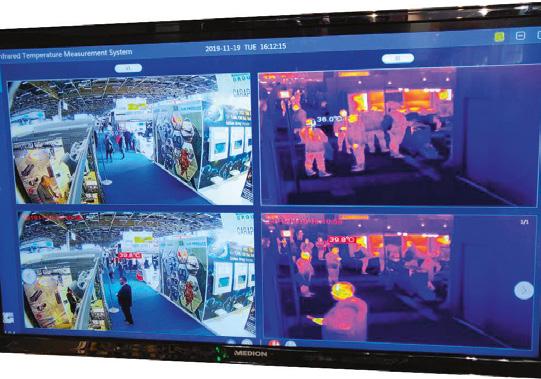
3 minute read
Corona crisis sparks Flemish fever scanner demand
As the corona crisis develops, Belgian Avalasia is being fl ooded with orders for its fever scanner. The camera, combined with heat vision, can measure the body temperature of individuals within large crowds. Originally marketing it as military equipment, the company couldn’t have predicted the sudden demand.
As many companies struggle to continue with operations, some are experiencing unprecedented activity. One such company is Belgium’s Avalasia, which develops and sells ‘fever scanners’. ese scanners can be used to measure the body temperature of individuals, in order to identify possible illness within large crowds. In the second week of March, the Menen-based company sold dozens, valued at 25,000 euros apiece. CEO Nico Ramacker: “I used to struggle to convince possible clients that checking their employees for body temperature was necessary. at hesitance has vanished completely.” ey never meant to make a pro t out of the crisis, emphasizes Ramacker. “ e scanner was already our core business. We’re just trying to ll this sudden need for detecting fever.” Ramacker explains that right now, they’re solely in reactive mode. “We couldn’t have predicted this sudden demand.”
Advertisement
Ramacker rst had the idea for the fever scanner during the 2002-2003 SARS epidemic in China. He stayed in Shanghai at the time and experienced the events rst-hand. In 2011, Avalasia was founded, at that time serving as a small enterprise active in the security sector. Over the past few years, the company specialized in heat vision cameras, as well as security solutions.
Jessica Vermeer
Military equipment
In 2018, Avalasia rst attempted to integrate its fever scanner system into regular cameras. is enables security guards to identify heightened body temperature of individuals in a crowd. A possible use is antiterrorism, as nervousness also causes a slight increase in body temperature.
Credit: Avalasia


After a year-long development phase, Avalasia presented the product at Milipol, an expo for homeland security and safety, in November 2019. e scanner itself consists of an IR camera that continuously calibrates with a regular video camera. e hardware is imported from China, whereas the software is developed in house. e heat camera identi es the individuals with heightened body temperature and then points them out on the regular image made by the video camera. e system can also be integrated into existing CCTV solutions. is means people won’t have to stop to be scanned. A large crowd can just pass the camera and a security guard can cherry-pick the outliers.
Crazy times
In 2019, Avalasia realized a turnover of 1.5 million euros. Naturally, the company expects to grow in 2020. “ ese are crazy times for us.” Most customers, especially in Belgium and the Netherlands, are in the food industry. “It makes sense that they’re

more cautious. However, we’ve also received orders from, for example, IT companies.” All these clients want to check their own employees when they come to work. “But outside of the Benelux, the scanners are also used in public areas.”
In November, the focus was still on antiterrorism and security. “Now, all other projects are paused as we try and meet the demand for fever scanners.” At this time, Avalasia’s biggest bottleneck lies in logistics. “We need to get our products up and running at the customers’ locations.”
Awareness
Avalasia is currently looking into a collaboration with Imec in Leuven, to help improve user experience. Ramacker hopes the corona crisis will increase public awareness of viruses. “ at’s something I noticed when I was in China. eir awareness of hygiene and contamination is much larger than ours.” For now, he wants to help face the crisis at hand. “We’ll have to work with what we have.”










